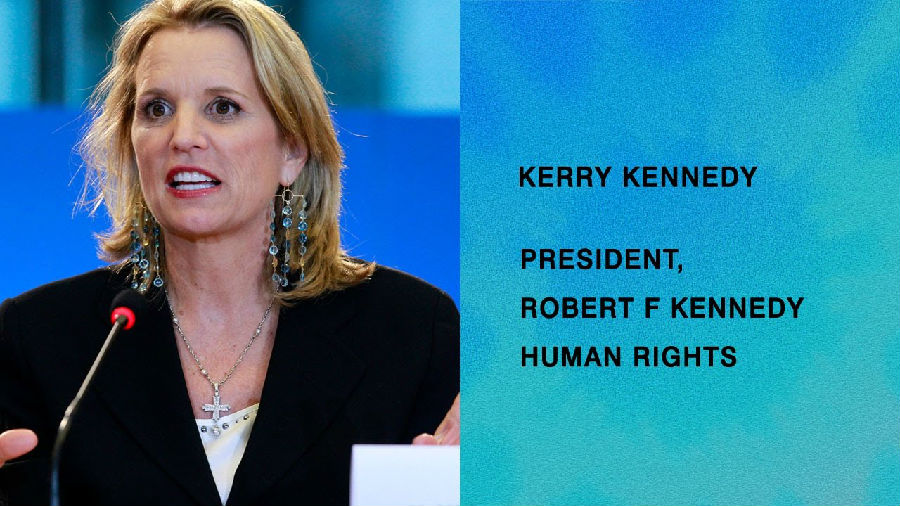IN THE 1950S, he spent much of his time on the Senate Committee on Investigations
上世纪50年代,他曾在参议院调查委员会工作了很长一段时间,
fighting the excesses of its chair, Joe McCarthy, and his chief counsel, Roy Cohn—two figures who echo in the news today.
与委员会主席乔·麦卡锡及其首席法律顾问罗伊·科恩——在今天的新闻里依然能看到两人的影子——的越权行为作斗争。
He later caused Cohn's resignation and led to the end of McCarthy’s reign of terror.
后来,科恩辞职,麦卡锡一手遮天时代被终结都有他的功劳。
Asked a decade later by Peter Maas how he could have worked for McCarthy,
十年后,被(记者兼作家)彼得·马斯问及为何会为麦卡锡工作时,
Kennedy responded, “Well, at the time, I thought there was a serious internal security threat to the United States…
肯尼迪回答说:“这个嘛,那时,我认为我们国家内部出现了严重的安全威胁……
(and) Joe McCarthy seemed to be the only one doing anything about it. I was wrong.”
而乔·麦卡锡看似是唯一一个没有袖手旁观的人。事实表明我错了。”
But to leave it at stopping the bullies would not do him justice.
不过,对他的评价仅仅停留在打抱不平一个层面还不够公道。
On that terrible night when he told a crowd in downtown Indianapolis that Martin Luther King Jr. had been murdered,
在那个可怕的夜晚,在印第安纳波利斯市中心向大家公布小马丁·路德·金被害一事时,
he included in his remarks a quote from Aeschylus:
他引用了(古希腊最伟大的悲剧作家)埃斯库罗斯的一句话:
“To tame the savageness of man and make gentle the life of the world.”
“驯服内心的狂野,让世人生活地更加美好。”
Indeed, my father focused much of his life taming the savageness, and he made gentle the life of the world.
的确,我父亲生平大部分时间都在致力于实现这一目标。

THERE WAS NO QUALITY my father admired more than courage, save perhaps love.
除了爱之外,我父亲最佩服的就是勇气。
I remember after dinner one night he picked up the battered poetry book that was always somewhere by his side
还记得有一天晚饭后,他拿起一本破旧的诗集,一本他经常会带在身边的诗集,
and read aloud Tennyson’s poem “The Charge of the Light Brigade.”
大声朗诵起了丁尼生的《前进吧,轻骑兵》。
We listened aghast to the story of a group of soldiers
我们惊愕地听他讲着一群士兵的故事。
whose commanding officer orders them to ride into an ambush, knowing they will be slaughtered—yet they still obey the command.
那群士兵的长官明知道他们必然会牺牲,还命令他们冲入埋伏圈,骑兵们竟然也听从了命令。
My father then explained that he and my mother were going on a trip
接着,父亲说他和母亲要去旅行,
and challenged us to a contest to see who could best memorize the poem while they were away.
他向我们发起挑战,看谁在他们不在的时候能把这首诗背得最好。
I did not win that contest—my sister Courtney did—but one stanza still remains with me:
那场比赛我没有赢——赢的是我妹妹考特尼——但其中有一个诗节至今仍然回荡在我耳边:
"Theirs not to reason why, Theirs but to do and die, Into the valley of Death Rode the six hundred"
“他们的责任不是追究原因,而是执行,是赴死,就这样,六百名骑兵踏入了死亡之谷”
Why would a father ask his ever expanding brood of what became 11 children to memorize a poem about war and slaughter?
一个父亲为什么要让他那队伍不断壮大,当时就已经有11人的孩子群背诵一首关于战争和杀戮的诗呢?
I think there were three reasons: He wanted to share with us his love of literature.
我认为有三个原因:他想同我们分享他对文学的热爱。
He wanted us to embrace challenges that appear daunting.
他希望我们接受那些看似令人胆怯的挑战。
But most of all, he believed it was imperative for us to question authority,
然而,最重要的是,他认为我们必须质疑权威,
and to learn how those who fail that lesson do so at their own peril.
同时学习那些未能吸取这一教训的人身处险境时是如何质疑权威的。
Now, coming upon 50 years after Robert F. Kennedy's last campaign,
现在正值罗伯特·F.肯尼迪最后一次竞选50周年之际,我想跟大家分享这些,
those are among the lessons I think he would have liked to impart to all Americans.
我想,这也是他希望传授给所有美国人的经验的一部分吧。
We face daunting challenges both nationally and globally.
当下,无论是就国内还是国外而言,我们都面临着严峻的挑战。
But we must rise to those tasks armed with courage, faith, love and an abiding commitment to justice,
但是,我们必须带着勇气、信心、爱心和对正义的坚定承诺,
yet girded with a healthy sense of skepticism.
以及适当的质疑来直面这些挑战。
译文由可可原创,仅供学习交流使用,未经许可请勿转载。


